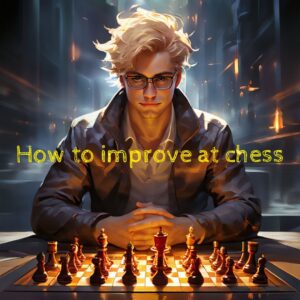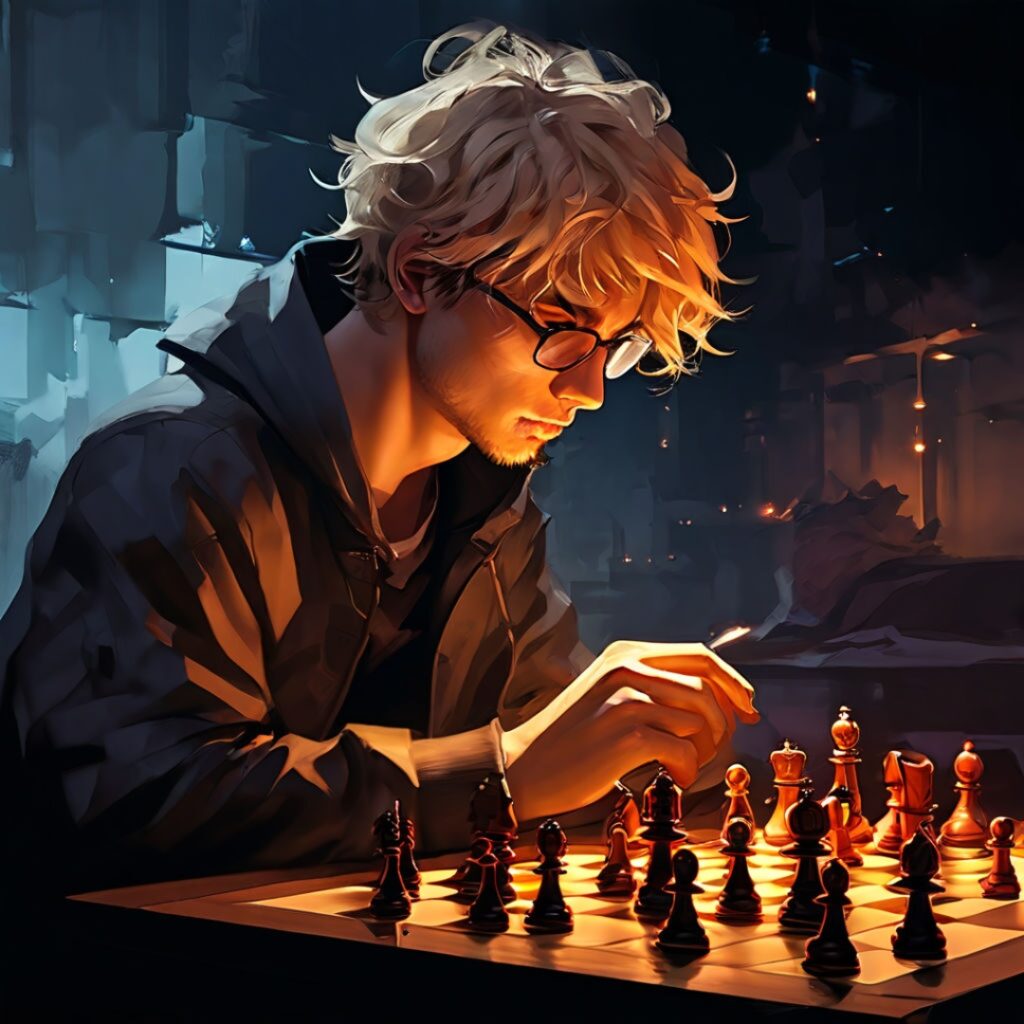
How to Improve at Chess: A Comprehensive Guide
Chess is more than just a game; it’s a lifelong journey of learning, strategy, and personal growth. Whether you’re a beginner looking to make your first move or an experienced player aiming to refine your skills, this guide will provide you with the tools and knowledge needed to improve your chess game. We’ll explore practical tips, advanced strategies, and valuable resources to help you on your path to chess mastery.
Table of Contents
- Understanding the Basics
- The Importance of Learning the Rules
- Familiarizing Yourself with the Chessboard
- Understanding Piece Movements
- Studying Chess Openings
- Why Openings Matter
- Popular Chess Openings and Their Strategies
- Resources for Learning Openings
- Mastering Middle Game Tactics
- The Role of Tactics in Chess
- Common Tactics: Forks, Pins, and Skewers
- Practicing Tactics with Online Tools
- Endgame Strategy
- The Importance of the Endgame
- Key Endgame Principles
- Practicing Endgames with Chess Engines
- Analyzing Your Games
- The Value of Post-Game Analysis
- Tools for Analyzing Games
- Learning from Mistakes
- Learning from the Masters
- Studying Grandmaster Games
- Understanding Historical Chess Matches
- The Influence of Famous Players
- Using Technology to Improve
- The Role of Chess Engines in Training
- How Chessiverse Can Help You Improve
- Using Online Resources and Apps
- Joining the Chess Community
- The Importance of Playing with Others
- Participating in Chess Tournaments
- Connecting with Chess Clubs and Online Communities
- Setting Goals and Staying Motivated
- Creating a Chess Improvement Plan
- Setting Achievable Goals
- Staying Positive and Motivated
1. Understanding the Basics
Before diving into advanced strategies, it’s essential to build a strong foundation in the basics of chess. Understanding the fundamental rules, how the pieces move, and the layout of the chessboard is crucial for any player, regardless of their level.
The Importance of Learning the Rules: Every game has rules, and chess is no exception. Knowing the basic rules of chess, such as how each piece moves and the objective of the game (checkmate), is the first step in improving your skills.
Familiarizing Yourself with the Chessboard: The chessboard consists of 64 squares, with each square alternating between light and dark colors. Understanding how the squares are labeled (with letters and numbers) will help you communicate moves and understand chess notation.
Understanding Piece Movements: Each chess piece has its unique movement pattern. For example, the knight moves in an “L” shape, while the bishop moves diagonally. Mastering these movements is essential for executing strategies and making effective moves.
2. Studying Chess Openings
The opening phase of a chess game is critical because it sets the tone for the rest of the match. A well-executed opening can provide you with a strong position and strategic advantages.
Why Openings Matter: The opening moves establish control of the board, especially the center. A good opening can lead to better piece development, control of key squares, and early threats against your opponent.
Popular Chess Openings and Their Strategies: There are countless chess openings, each with its unique strategies. Some popular openings include the Ruy López, Sicilian Defense, French Defense, and Queen’s Gambit. Each opening has its strengths and weaknesses, so it’s important to study and practice them.
Resources for Learning Openings: Platforms like Chessiverse offer detailed lessons on various openings. You can practice different openings against chess bots tailored to mimic the style of famous grandmasters, helping you understand the nuances of each opening.
3. Mastering Middle Game Tactics
The middle game is where the real battle happens. It’s the phase where tactics come into play, and understanding these tactics is crucial for outmaneuvering your opponent.
The Role of Tactics in Chess: Tactics are short-term, often forceful sequences of moves that can gain a material advantage or deliver checkmate. Mastering tactics will allow you to exploit your opponent’s mistakes and turn the game in your favor.
Common Tactics: Forks, Pins, and Skewers:
- Forks occur when one piece attacks two or more of the opponent’s pieces simultaneously.
- Pins trap an opponent’s piece in such a way that moving it would expose a more valuable piece behind it.
- Skewers are similar to pins, but the more valuable piece is in front, forcing it to move and exposing a weaker piece behind.
Practicing Tactics with Online Tools: Online tools and apps, like those available on Chessiverse, offer tactical puzzles that can help you recognize and execute these tactics in your games.

4. Endgame Strategy
The endgame is the final phase of a chess game, and it often determines the outcome. Mastering endgame strategies is crucial for converting an advantage into a win or securing a draw in a difficult position.
The Importance of the Endgame: In the endgame, fewer pieces remain on the board, making each move more critical. Understanding endgame principles, such as the importance of pawn structure and king activity, can make a significant difference.
Key Endgame Principles:
- King Activity: In the endgame, the king becomes a powerful piece. Bringing your king into the action can help you control key squares and support your pawns.
- Pawn Promotion: Advancing your pawns to the promotion square is a common endgame goal. Once promoted, a pawn can become a queen or another piece, giving you a decisive advantage.
- Opposition: Understanding opposition, where one king controls key squares to prevent the opposing king’s advance, is essential in pawn endgames.
Practicing Endgames with Chess Engines: Platforms like Chessiverse allow you to practice endgame scenarios against chess bots. These engines can simulate various endgame situations, helping you develop your skills and understand key concepts.
5. Analyzing Your Games
One of the most effective ways to improve at chess is by analyzing your own games. Reviewing your moves and understanding where you went wrong can provide valuable insights into your strengths and weaknesses.
The Value of Post-Game Analysis: After each game, take the time to review the moves and strategies you used. Look for patterns in your play, such as common mistakes or missed opportunities. Analyzing your games helps you learn from your mistakes and avoid repeating them in future matches.
Learning from Mistakes: Don’t be discouraged by losses; instead, view them as opportunities to learn. Understanding why a particular move was a mistake and what alternative moves you could have made will make you a stronger player.
6. Learning from the Masters
Studying the games of grandmasters is a powerful way to improve your own play. By analyzing their strategies and understanding their thought processes, you can gain valuable insights into advanced chess concepts.
Studying Grandmaster Games: Grandmasters have spent years mastering the game, and their games are full of instructive moments. By studying their games, you can learn how to handle different types of positions, execute complex strategies, and think several moves ahead.
Understanding Historical Chess Matches: Historical matches between famous players, such as Bobby Fischer vs. Boris Spassky or Garry Kasparov vs. Anatoly Karpov, offer a wealth of knowledge. These games often feature brilliant strategies and tactics that can be applied to your own play.
The Influence of Famous Players: Players like Magnus Carlsen, Judith Polgar, and Hikaru Nakamura have all left their mark on the chess world. Studying their games and understanding their approaches to different positions can inspire and educate you.
7. Using Technology to Improve
In the modern era, technology has become an invaluable tool for chess improvement. Chess engines, online platforms, and apps can help you practice, analyze, and learn from your games.
The Role of Chess Engines in Training: Chess engines are powerful tools that can analyze positions, suggest moves, and simulate games. By playing against a chess engine, you can practice different scenarios and learn from the engine’s suggestions. Chessiverse offers a wide range of chess Bots over 500 human like chess bots with varying difficulty levels, allowing you to practice against opponents tailored to your skill level.
How Chessiverse Can Help You Improve: Chessiverse is a platform that offers a variety of resources for chess improvement. From interactive lessons on openings and tactics to endgame practice and game analysis, Chessiverse provides everything you need to take your game to the next level. Additionally, Chessiverse’s chess bots, each with unique playing styles, allow you to practice against opponents that mimic famous players, helping you prepare for real-world matches.
Using Online Resources and Apps: There are countless online resources and apps available for chess players. Websites like Chessiverse, Lichess, Chess.com, and Chessbase offer lessons, puzzles, and games that can help you improve. By using these resources regularly, you can practice different aspects of the game and track your progress over time.
8. Joining the Chess Community
Chess is not just a solitary game; it’s also a social activity that connects people from all over the world. By joining the chess community, you can gain experience, learn from others, and make new friends.
The Importance of Playing with Others: Playing against other people, whether online or in person, is one of the best ways to improve at chess. Human opponents provide a level of unpredictability and challenge that can help you develop your skills and test your strategies.
Participating in Chess Tournaments: Chess tournaments offer an excellent opportunity to test your skills against other players. Whether you’re playing in local tournaments or online competitions, participating in tournaments can help you gain experience and measure your progress.
Connecting with Chess Clubs and Online Communities: Joining a chess club or participating in online chess communities can provide valuable opportunities for learning and growth. These communities often host events, provide resources, and offer a supportive environment where you can share your experiences and learn from others.
9. Setting Goals and Staying Motivated
Improving at chess is a journey that requires dedication and perseverance. By setting clear goals and staying motivated, you can make steady progress and enjoy the process of learning.
Creating a Chess Improvement Plan: A chess improvement plan is a roadmap that outlines your goals and the steps you’ll take to achieve them. Whether your goal is to reach a certain rating, master a specific opening, or play more games, having a plan will help you stay focused and organized.
Setting Achievable Goals: When setting goals, it’s important to be realistic and set achievable targets. For example, instead of aiming to become a grandmaster overnight, focus on improving your rating by a certain number of points each month. Setting small, manageable goals will help you stay motivated and celebrate your progress.
Staying Positive and Motivated: Chess can be challenging, and it’s easy to get discouraged after a loss. However, it’s important to stay positive and remember that every setback is an opportunity to learn. Surround yourself with supportive friends and mentors, and keep a positive attitude as you work towards your goals.
Conclusion
The answer of the universal question ” how to improve your chess ?” is a rewarding journey that requires dedication, practice, and a willingness to learn. By building a strong foundation in the basics, studying advanced strategies, and using technology to your advantage, you can make steady progress and achieve your chess goals. Remember, every great chess player started as a beginner, so stay optimistic and enjoy the game! With resources like Chessiverse and the support of the chess community, you’re well on your way to becoming a stronger, more confident chess player.
